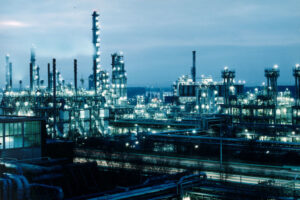There are many areas in a chemical production plant where automation offers increased productivity and, ultimately, improved profitability. Switching to self-cleaning filters enhances safety and brings many benefits to continuous liquid flow lines with a very rapid return on a relatively small investment.
The author: Paul Baker Sales and Business Development Manager, SPX Flow Technology
The need for filtration of continuous liquid flows exists in many processes within the chemical industry. Filters are used to clean a fluid by removing solid particles, which vary in size according to the application. Filtration may be required to clarify the final product or protect other items of equipment such as pumps, nozzles or valves from damage or clogging. It is also essential to prepare fluids for recycling back into a system after first use or to clean them for easier waste disposal.
With its Airpel filtration product series, SPX provides innovative self-cleaning filters which use scraper blades to remove debris from the filter element and deposit it into the bottom of the filter body, from where it can be jettisoned either manually or automatically. The method permits cleaning down to particle sizes as small as 25 µm without interrupting the flow. The units are completely enclosed and offer an environmentally friendly solution with minimal flushing losses.
The filters can be supplied in a manual, motor-ised or automatic version. In the case of the fully automated type, an electric or pneumatic motor turns the shaft in order to clean the filter element against the scraper blades when the pressure drop across the device reaches a given level. An actuated dump valve then opens automatically to release debris periodically. This fully automated mode of operation enables the process to run continuously without any operator intervention.
Improved productivity
Self-cleaning filters improve productivity. There is no need either for a bypass to the fluid line or for a separate cleaning process. Once the unit is installed in the line, day-to-day operation can take place without interruption. Scheduled, preventative maintenance of the filters is typically required only once or twice a year. One key benefit for the chemical industry is that operators no longer have any direct contact with the cleaning elements or fluids, protecting from hazardous substances and giving them more time for other tasks elsewhere in the plant.
Unlike plunger type filters, which have a protruding shaft for the piston in its resting position, the cleaning scraper blade is contained within the filter body and, as such, less prone to damage or destabilisation. The payback period is fast compared with alternative technologies such as bag filters: the return on investment is accelerated by the reduced need for human operators and the elimination of certain consumables (e. g. bags) as well as shorter downtime, higher throughput and lower fluid loss during the cleaning cycle.
For the chemical industry the advantages of a system that requires no operator intervention are obvious. The self-cleaning filters ensure a permanently free-flowing system and provide absolute protection from hazardous fluids for both the operator and the environment. SPX offers a number of standard models, either manual or automatic, with flow rates up to 3000 l/min and working pressures up to 35 bar. Customised designs with a maximum flow rate of 18,000 l/min are also possible.
Filter applications
In one application SPX supplied four Airpel self-cleaning filters to a chemical processing plant which manufactures herbicides and weed killers. It was imperative that the chemical herbicides were contained within the system for operator safety and environmental reasons. The highly efficient 200 µm meshes removed scaling and foreign particles from the production chemicals and final products. Automatic self-cleaning is activated when the pressure drop reaches 0.2 bar, preventing the herbicides from harming the operator and the environment.
In many applications the debris itself may be a revenue stream that can add to the profitability of an operation. In production facilities where combustible liquid waste is initially jettisoned, these materials (oils, paints, solvents, etc.) can often be filtered and mixed before being resold to cement manufacturers as a base fuel. Thanks also to the minimal flushing losses for the filtration process itself, these units offer an environmentally friendly solution that is designed to minimise waste and maximise profitability.
The scraper blade filters can help increase efficiency in the chemical industry. In another application Airpel filters replaced an existing backwash sieve system, which was proving unreliable. Two automatic, self-cleaning filters were installed in parallel to achieve a service/standby solution. The SPX system provided greater reliability, less liquid loss during the cleaning process and superior productivity with a higher throughput per hour compared with the old system.
SPX Airpel self-cleaning filters require very little maintenance and no day-to-day operator intervention or manual cleaning – a significant benefit in the chemical industry. Their self-contained design ensures reliable operation with almost no loss of fluids and improved operator safety. In continuous operation with a wide range of viscosities these units result in increased efficiency with minimal disruption to the product flow and hence higher throughput.
cpp-net.com/0113467
Share:






